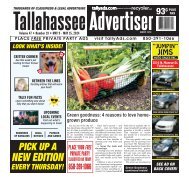Create successful ePaper yourself
Turn your PDF publications into a flip-book with our unique Google optimized e-Paper software.
Thetrucker.com SEPTEMBER 2023 • 19<br />
JOB Resources<br />
Vital role<br />
Trucking industry offers variety of careers in addition to driving<br />
KRIS RUTHERFORD | special correspondent<br />
When many people think of careers in the trucking industry, the first thing that pops into<br />
their minds is the most obvious — truck driver.<br />
However, the industry offers a wealth of other job opportunities, from logistics experts to<br />
fleet managers, safety specialists, office staff and more. One job that is often overlooked is one<br />
that is vital to keeping trucks on the road.<br />
Diesel technicians (or mechanics, if you’re old-school) play a vital role in the nation’s supply<br />
chain — and there is currently a shortage.<br />
Trade jobs are becoming more appealing, especially with college costs soaring and the issue<br />
of student debt has become a political issue.<br />
High school programs across the country are providing resources for students who are interested<br />
in training for a trade. Most of these students are seeking careers touted as “recessionproof.”<br />
The role of diesel technician and mechanic is one of those trades.<br />
Even so, the number of new diesel technicians has failed to keep pace with industry needs.<br />
“College is not for everyone,” said Lucas Subler, president of Ohio-based Classic Carriers. “I<br />
believe that narrative is starting to gain some traction in many areas of the country.”<br />
Subler notes that the cost of college has deterred many high school students from looking at<br />
traditional higher education. The trades, including diesel mechanics, are an attractive alternative.<br />
“The lure of getting kids into trades early on in life and making a great living is starting to<br />
resonate,” he said.<br />
Of course, preparation for a trade, like preparation for college, is something that begins in<br />
high school. Subler lauds schools that are presenting trades programs through creative partnerships.<br />
“Our high school runs an apprenticeship through its Future Farmers of America (FFA) program,”<br />
Subler said. “The FFA finds the kids that are interested in a wide variety of trades and<br />
places them with businesses in our area looking for labor.”<br />
This “Capstone” program allows high school students to attend school part time and work<br />
part time in their chosen trade. The number of hours a student is allowed to leave school to work<br />
is determined by the student’s grade point average; this information is provided to the student’s<br />
work supervisor.<br />
Love’s Travel Stops has presented another alternative to those wishing to become diesel<br />
technicians. Love’s recently celebrated the 300th graduate of its in-house training program,<br />
Love’s Truck Care Academy, a partnership with Speedco. The program, launched in April 2022,<br />
See TECHNICIAN on PAGE 20<br />
iStock Photo<br />
Motor carriers desperately need qualified diesel technicians to ensure trucks and other equipment are in good<br />
working condition.<br />
TRUCKING TIPS<br />
Picking the right time to change jobs can be as important as finding the right carrier<br />
iStock<br />
There are many factors to consider before changing motor carriers, including<br />
the current freight market, benefits, leave time and more.<br />
CLIFF ABBO<strong>TT</strong> | SPECIAL CORRESPONDENT<br />
The trucking industry is known for high driver turnover<br />
rates for a number of reasons.<br />
For one thing, many of the jobs are on the road. There’s<br />
no requirement to show up at a physical location every day,<br />
unless your job is local in nature. For everyone else — namely<br />
over-the-road, or OTR, drivers — the home address is their<br />
home is listed as a “domicile” in carrier records and is simply<br />
an address the driver must be sent to for “home time.”<br />
Because many drivers live in a truck most days and nights,<br />
carriers can be changed at will.<br />
Drivers leave carriers for a variety of reasons. The most<br />
commonly reported ones are compensation, number of miles<br />
and perceived treatment from superiors. Sometimes drivers<br />
don’t have a choice; for instance, a carrier may close or<br />
downsize its fleet, or the driver may involuntarily terminated.<br />
Most of the time, however, the driver makes the decision<br />
to leave. All too often, industry and economic conditions<br />
aren’t a consideration when changing jobs … but they should<br />
be.<br />
Trucking goes through repetitive cycles of boom and bust.<br />
The market is ruled by the principle of supply and demand,<br />
with “demand” being the need for trucks to haul freight and<br />
“supply” being the number of available trucks. When there is<br />
a lot of freight, trucks are in greater demand and shippers are<br />
willing to pay higher rates to get their product moved.<br />
As you would expect, when freight rates rise, carriers<br />
want to haul as much as they can. They buy more trucks<br />
and expand their fleets in order to earn as much revenue as<br />
possible. But at some point the number of trucks exceeds the<br />
amount needed for available freight. Sometimes it’s because<br />
carriers bought too many trucks. Sometimes it’s because<br />
freight levels fell due to recession or other factors. Usually it’s<br />
a combination of both.<br />
The industry is currently in a “downcycle” that is expected<br />
to continue for a few more months. That means rates are low<br />
and truckers are competing for available loads.<br />
How does all this impact the job market? When carriers<br />
are expanding their fleets, they look to hire more drivers.<br />
Some are willing to relax hiring standards by, for example,<br />
See TIPS on PAGE 20

















